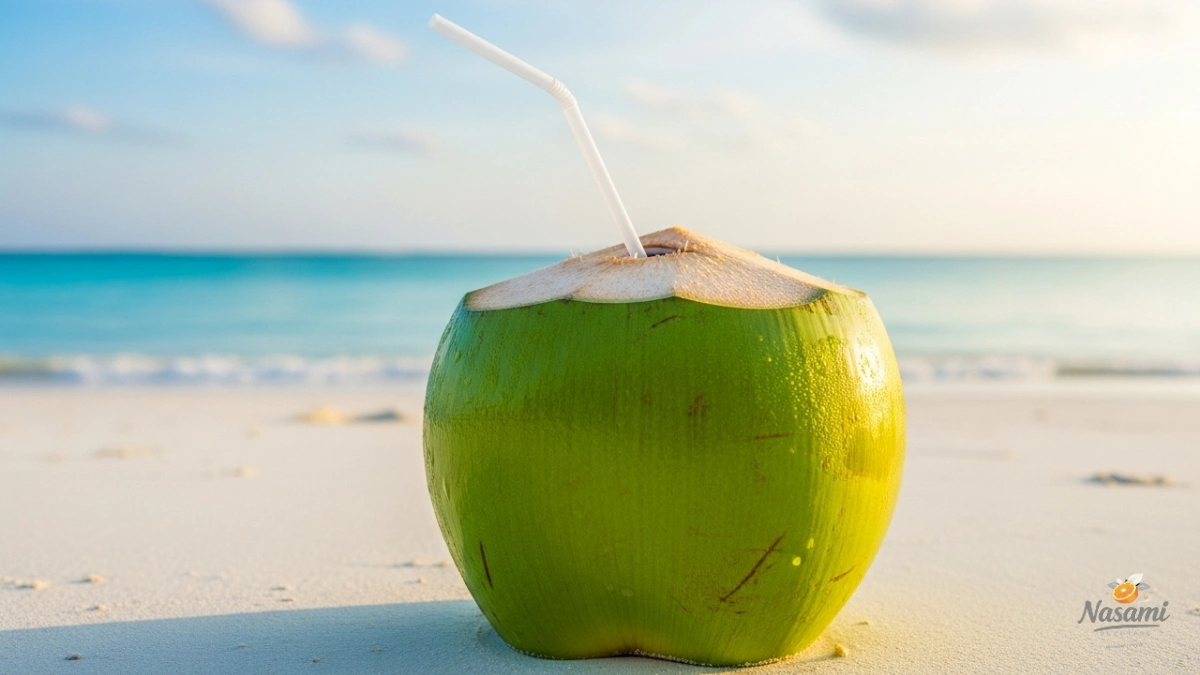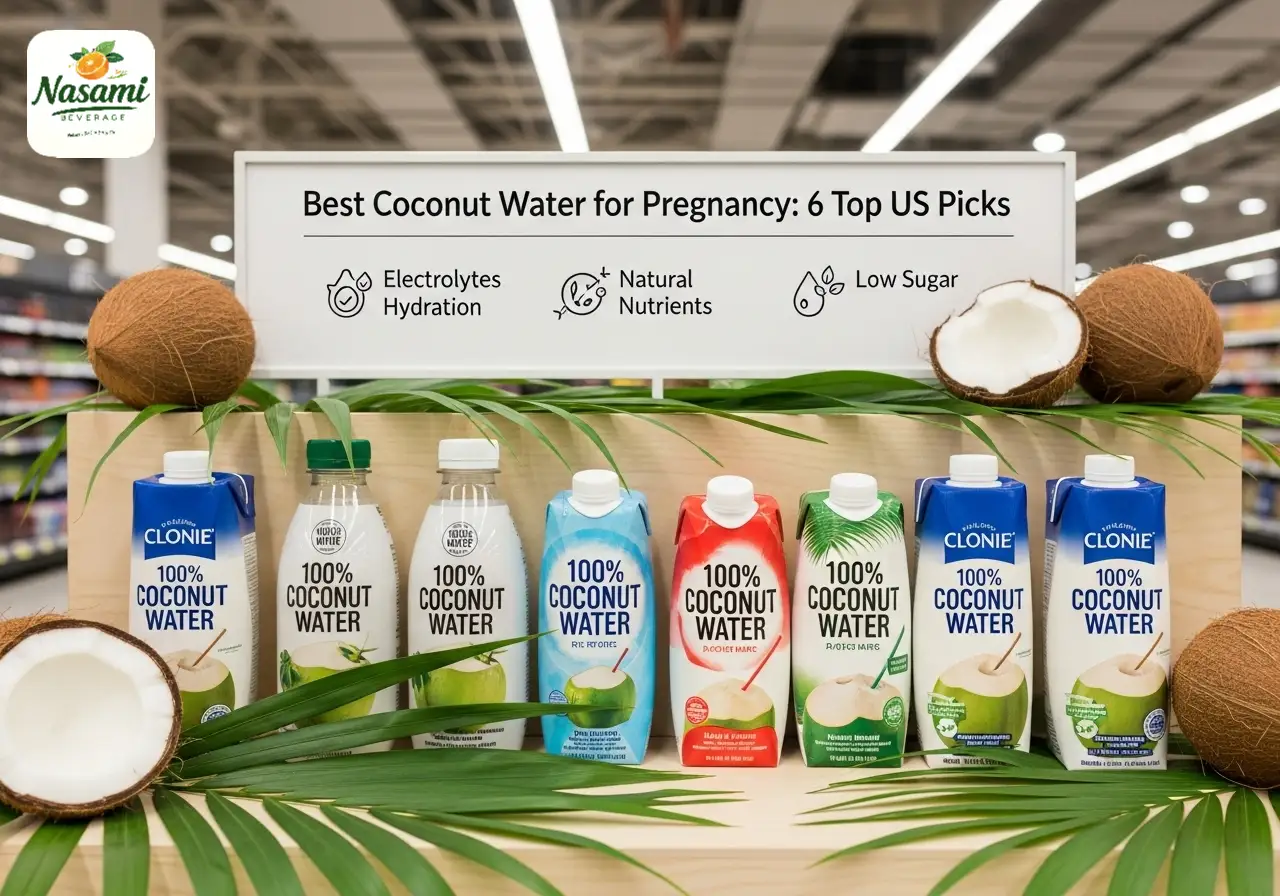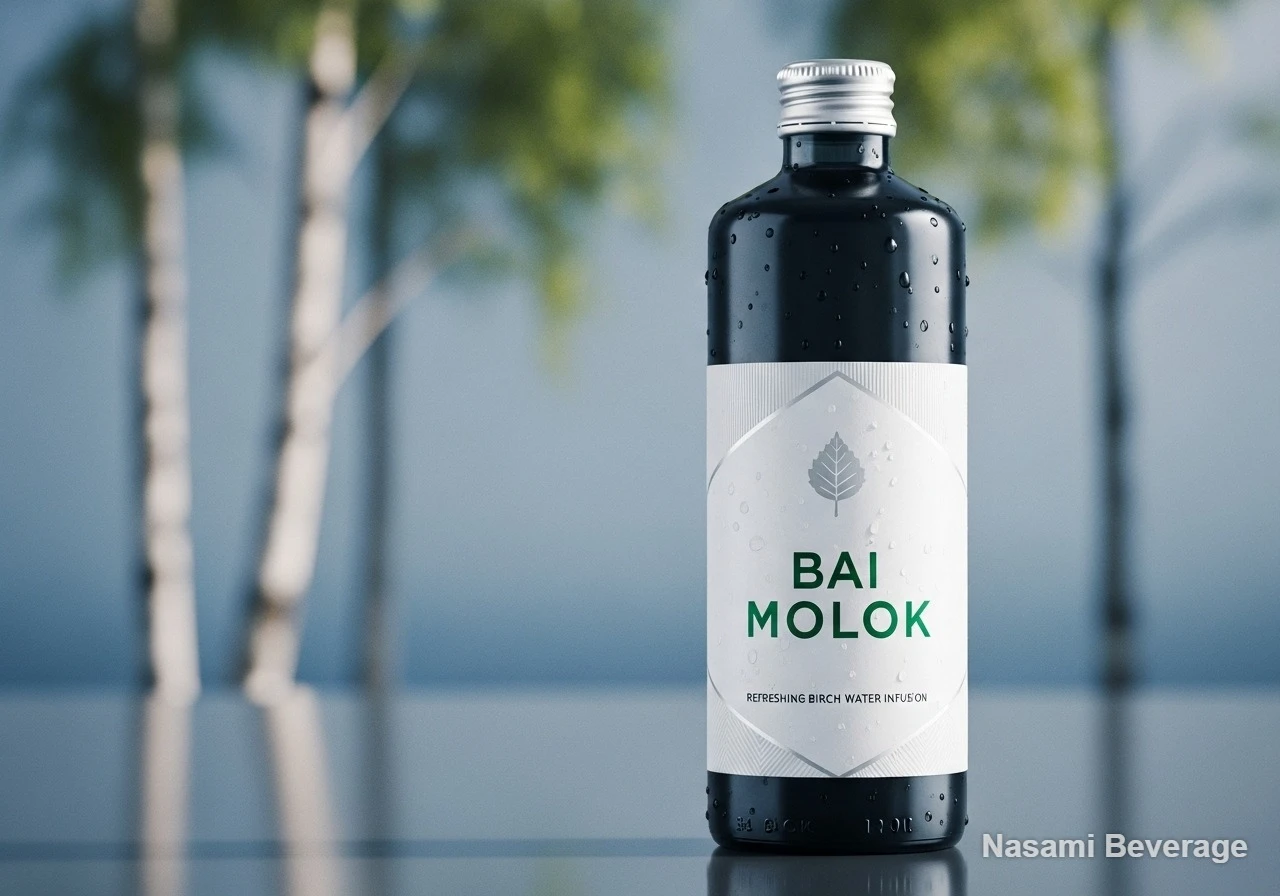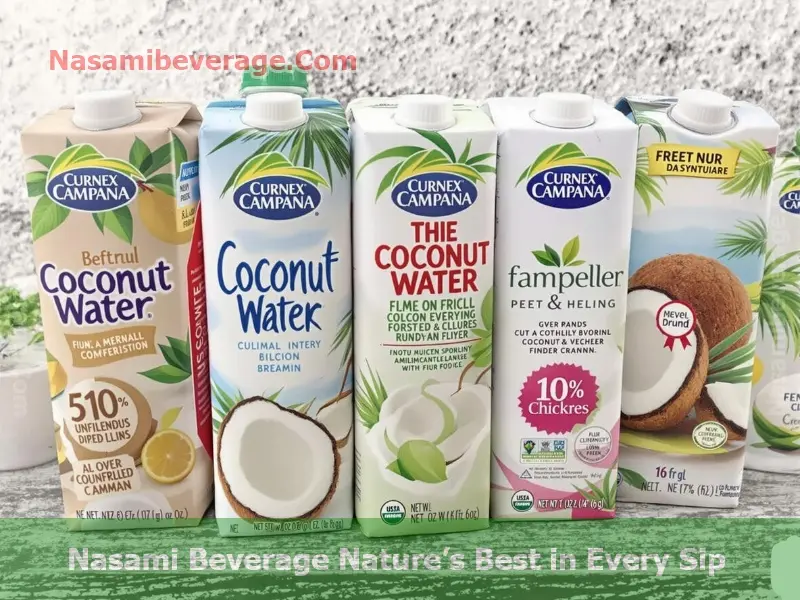Walk down any beverage aisle, and you’ll see shelves stocked with various brands of coconut water, from popular names like Vita Coco and Harmless Harvest to specialty options like those offered by Nasami Beverage. Touted as a natural superdrink, it has gained immense popularity for its refreshing taste and purported health benefits. But beyond the marketing hype, the question remains: is coconut water healthy?
This comprehensive guide will explore the nutritional science, potential benefits, and important considerations of incorporating coconut water into your diet.
Disclaimer: This information is for educational purposes only and does not replace professional medical or veterinary advice. Always consult a qualified professional before making decisions related to your health or your pet’s health.
What is Coconut Water?
The clear liquid from young, green coconuts
Coconut water is the clear, slightly sweet liquid found inside young, green coconuts (Cocos nucifera). It’s not to be confused with coconut milk, which is a creamy, white liquid made from the grated pulp of mature brown coconuts. As a coconut matures, the water is gradually replaced by the coconut meat. [1] This natural beverage is harvested when the coconut is around 6-7 months old, the point at which it has the most water.
Difference between coconut water and coconut milk
The primary difference lies in their composition and nutritional value. Coconut water is about 94% water and is very low in fat. In contrast, coconut milk has a much higher fat content (around 50%) and significantly more calories, as it’s an emulsion of coconut flesh and water. [2]
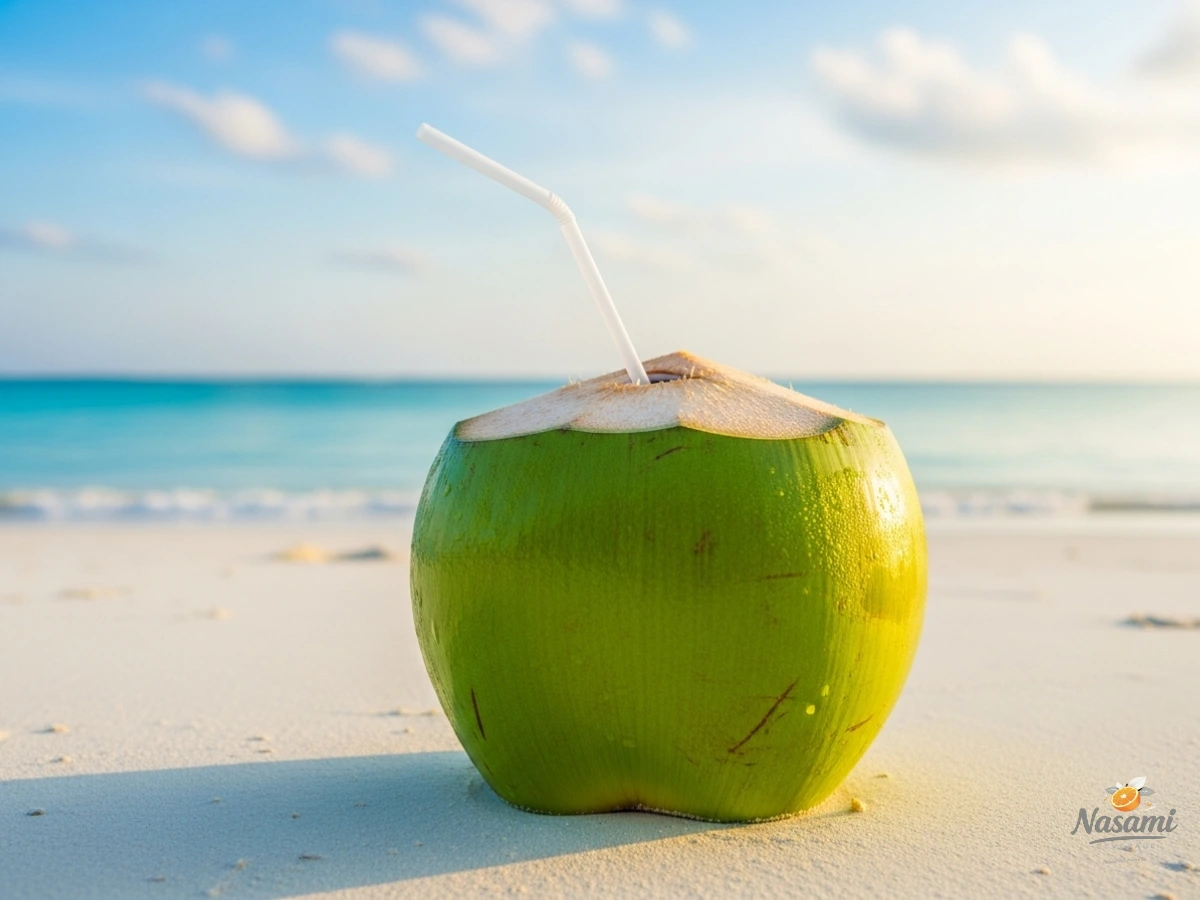
A brief history of its use in tropical regions
For centuries, people in tropical regions like Southeast Asia, the Pacific Islands, and the Caribbean have consumed fresh coconut water directly from the fruit. It has been valued not only as a refreshing drink but also for its hydrating properties in hot climates. Historically, it was even used as an emergency intravenous hydration fluid during World War II due to its sterility and similarity to human blood plasma. [3]
Nutritional Profile of Coconut Water
Understanding the nutritional value of coconut water is key to determining its health benefits. The exact composition can vary based on the coconut’s maturity, but on average, one cup (about 240ml) of unsweetened coconut water contains a range of important nutrients.
Calories, carbohydrates, and natural sugars
One cup of unsweetened coconut water typically contains 45-60 calories, most of which come from its 11-15 grams of carbohydrates. These carbohydrates are primarily natural sugars like fructose and glucose, which give the drink its subtly sweet taste. [4]
Key electrolytes: Potassium, sodium, magnesium, and calcium
Coconut water’s claim to fame is its rich electrolyte content. Electrolytes are minerals that are vital for several bodily functions, including maintaining proper fluid balance and nerve function. One cup can provide:
- Potassium: Around 600 mg, which is about 13% of the Daily Value (DV). This is more potassium than a medium banana. [5]
- Sodium: Approximately 252 mg (11% of the DV), though this can vary widely between brands.
- Magnesium: About 60 mg (14% of the DV).
- Calcium: Roughly 58 mg (4% of the DV).
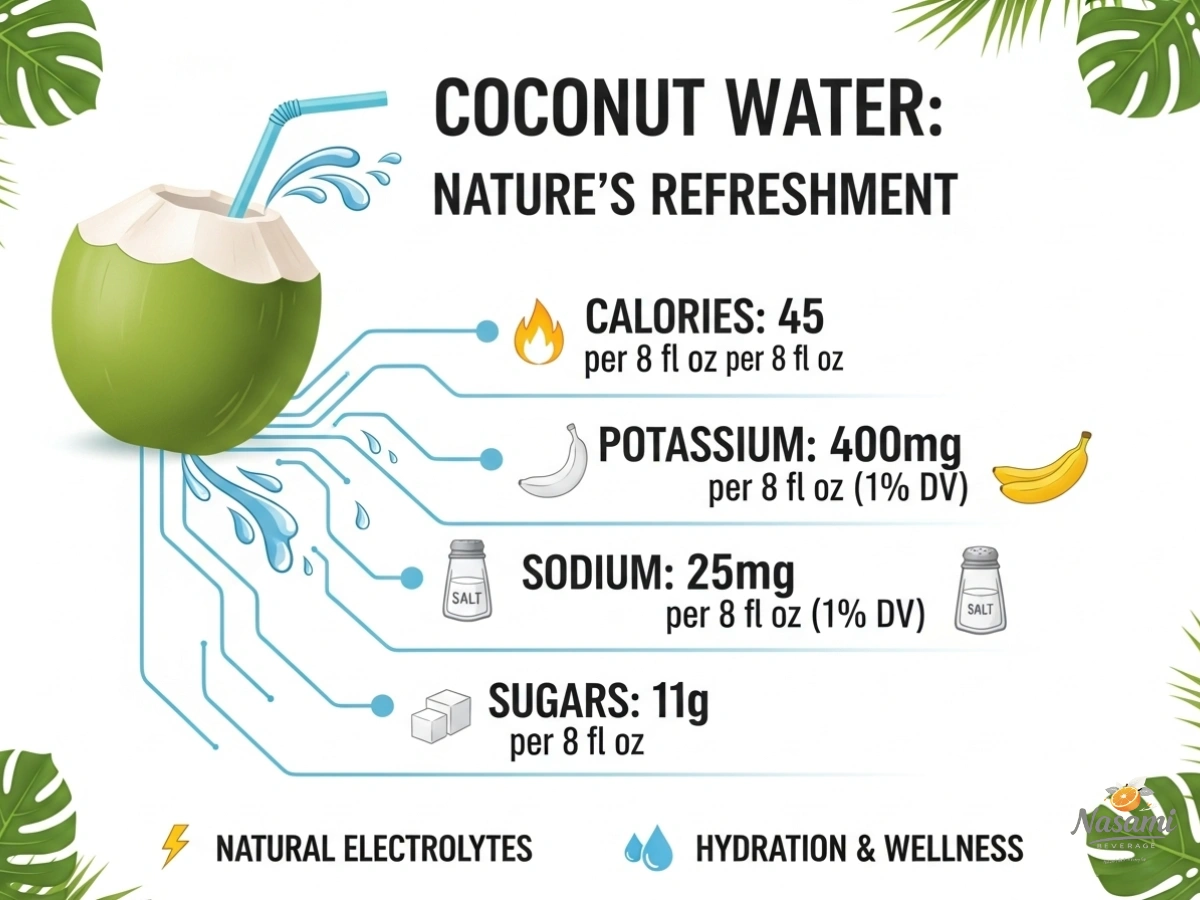
Vitamins and minerals
Beyond electrolytes, coconut water also offers small amounts of other micronutrients, including manganese, vitamin C, and some B-vitamins. It’s particularly rich in manganese, providing over 100% of the DV in some varieties, which is important for bone health and metabolism. [6]
The Health Benefits of Coconut Water
Thanks to its unique nutritional profile, coconut water is associated with several potential health benefits. While it’s not a cure-all, research suggests it can be a valuable addition to a balanced diet.
A Natural Source of Hydration and Electrolytes
With its high water and electrolyte content, coconut water is an excellent natural hydrator. It helps replenish fluids and minerals lost through sweat, making it a popular choice for athletes and active individuals. This makes it an effective tool for understanding are coconut water good for you in the context of physical activity.
May Support Heart Health by Lowering Blood Pressure
The high potassium content in coconut water can play a role in managing blood pressure. Potassium helps counteract the effects of sodium, a mineral that can raise blood pressure in some people. Some small studies have indicated that regular consumption of coconut water may help lower blood pressure in individuals with hypertension. [7]
Potential Role in Preventing Kidney Stones
Staying hydrated is crucial for preventing kidney stones. Some research suggests that coconut water may be even more beneficial than plain water. Studies in rats have shown that coconut water prevented crystals from sticking to the kidneys and other parts of the urinary tract. [8] However, more research in humans is needed to confirm these effects.
Beneficial for Post-Workout Recovery
For moderate exercise, coconut water can be an effective post-workout beverage. It helps rehydrate the body and replenishes electrolytes like potassium and magnesium that are lost during physical activity, potentially aiding in muscle recovery and preventing cramps. [9]
Antioxidant Properties
Coconut water contains antioxidants that help neutralize oxidative stress and free radicals, which are unstable molecules that can cause cellular damage. While research is still emerging, animal studies have shown that the antioxidants in coconut water may help protect against damage caused by toxins. [10]
Coconut Water for Specific Goals
Many people turn to coconut water to support specific health and wellness objectives, from weight management to clearer skin.
Weight Management: A Low-Calorie Alternative
As a low-calorie, naturally sweet beverage, plain coconut water can be a smart substitute for high-calorie drinks like sodas, juices, and sweetened teas. Making this swap can help reduce overall calorie intake, which is a key component of weight management. Its hydrating properties can also help you feel full, potentially reducing overeating.
Skin Health: Hydration for a Natural Glow
Proper hydration is essential for healthy, plump skin. By helping you meet your daily fluid needs, coconut water can contribute to better skin hydration from the inside out. Some proponents also apply it topically, though scientific evidence for its direct skin benefits is limited.
During Pregnancy: A Safe Hydration Option
For many pregnant women, staying hydrated can be a challenge, especially during morning sickness. Unsweetened coconut water can be a safe and effective way to replenish fluids and electrolytes. However, it’s always best for pregnant individuals to consult with their healthcare provider before making any significant dietary changes.
Coconut Water vs. Other Beverages
How does coconut water stack up against other popular drinks? Its healthiness is often relative to what you’re comparing it with.
Coconut Water vs. Plain Water
For everyday hydration for the average person, plain water is unbeatable. It’s calorie-free, sugar-free, and readily available. Coconut water has the edge when you need to replenish electrolytes quickly, such as after a prolonged, sweaty workout or a bout of illness. [11]
Coconut Water vs. Sports Drinks
Many commercial sports drinks are high in added sugars and artificial colors. Unsweetened coconut water offers a more natural alternative for rehydration. It typically has more potassium but less sodium and carbohydrates than traditional sports drinks.

For elite athletes or those engaged in very intense, long-duration exercise, a specifically formulated sports drink might be better for replacing sodium and providing quick energy. [12]
Potential Side Effects and Considerations – Is Coconut Water Healthy for Everyone?
While generally safe for most people, coconut water isn’t suitable for everyone, and moderation is key.
High in Potassium: A Concern for Individuals with Kidney Problems
The high potassium content can be dangerous for individuals with chronic kidney disease or other kidney issues, as their bodies cannot effectively remove excess potassium from the blood. This can lead to a condition called hyperkalemia, which can be life-threatening. [13]
Sugar Content and Diabetes
Though the sugar in coconut water is natural, it still contributes to carbohydrate intake and can affect blood sugar levels. People with diabetes should consume it in moderation and factor it into their meal plan, preferably choosing unsweetened varieties.
Possible Digestive Issues
Drinking large quantities of coconut water may cause digestive upset, such as bloating and stomach discomfort, in some individuals. It can also have a laxative effect due to its high potassium levels.
Potential for Allergic Reactions
Although rare, allergies to coconut, which is a tree nut, do exist. Individuals with tree nut allergies should exercise caution and consult with an allergist.
How to Choose the Best Coconut Water
Not all packaged coconut waters are created equal. To reap the most benefits, it’s important to be a savvy shopper.
Reading the Label: Checking for Added Sugars
Always opt for products that list “100% coconut water” as the only ingredient. Many brands add sugar, sweeteners, or fruit “flavors” (which are often just more sugar) that increase the calorie count and negate many of the health benefits. Look for options labeled as the best organic coconut water to avoid pesticides and other additives.
Fresh vs. Packaged: What to Look For
If you have access to it, fresh coconut water straight from the coconut is the most natural and nutrient-rich option. When buying packaged products, look for those that are not from concentrate, as the heating process used for concentrate can destroy some of the beneficial enzymes and nutrients.
The Verdict: Is Coconut Water Healthy?
So, what’s the final word? For the majority of healthy, active people, coconut water is a healthy beverage choice when consumed in moderation. It serves as a fantastic, low-calorie natural alternative to sugary sodas and juices and can be particularly beneficial for hydration and electrolyte replenishment after moderate exercise.
However, it’s not a magical health elixir. Its benefits are most pronounced when it replaces less healthy drink choices. Individuals with kidney disease or diabetes should be cautious and consult their doctor. For everyday hydration, good old-fashioned water remains the gold standard.
Discover more healthy drinks and tips on our blog.
Frequently Asked Questions
Is it good to drink coconut water every day?
For most healthy individuals, drinking a moderate amount of coconut water (such as one cup) daily is generally safe and can be a good source of hydration and nutrients. However, people with kidney issues or those on specific low-potassium diets should consult a healthcare professional. [14]
Does coconut water help you lose belly fat?
No single food or drink can target belly fat. However, because coconut water is lower in calories than many sugary beverages, substituting it for sodas or sweetened juices can help reduce your overall calorie intake, which supports a healthy weight management plan that can lead to fat loss over time.
Is coconut water better than water for hydration?
For routine daily hydration, plain water is perfectly sufficient and has zero calories. Coconut water’s advantage comes from its electrolytes, which makes it more comparable to a sports drink for rehydration after intense exercise or illness where significant fluid and minerals are lost. [15]
Can I drink coconut water if I have diabetes?
Coconut water contains natural sugars that can impact blood sugar levels. If you have diabetes, it’s crucial to drink it in moderation, choose unsweetened varieties, and account for the carbohydrates in your diet. It is always best to discuss it with your doctor or a registered dietitian first. [16]
